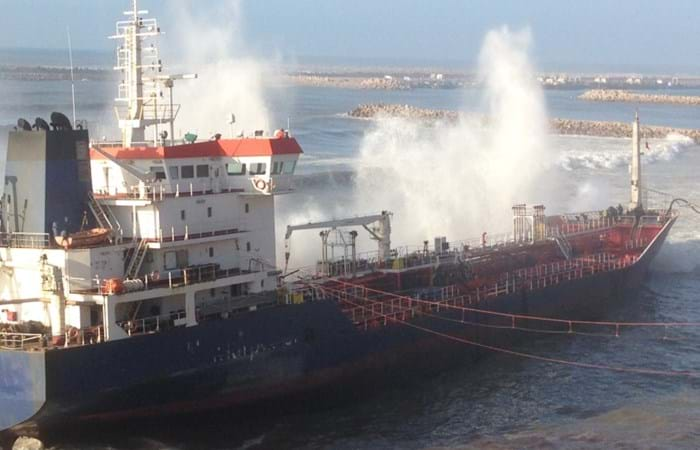On the 23rd of December the product tanker ‘Silver’ (6,672 DWT), loaded with 4,900Mt of HFO, ran aground on the rocks near the breakwaters of Tantan port, Morocco. After several initial refloating attempts by local tugs were unsuccessful, SMIT Salvage was contracted on a LOF basis on the 25th of December to render assistance through the immediate mobilization of tugs, equipment and a salvage team. Meanwhile, the vessel was lifted higher on the rocks by heavy swells, which left her at a distance of 75 m off the coastline, parallel to high cliffs. The crew on board noted water ingress in several ballast tanks and a small sheen of oil was observed.
At short notice SMIT mobilized the Fairmount Glacier, a large team of SMIT Salvage experts, plus an additional contingent of oil pollution prevention experts, who arrived on the 25th and 26th of December. Shortly thereafter, 30t of salvage equipment arrived from Rotterdam on two chartered Antonov flights. Helicopters safely transported personnel and equipment to the scene.
Upon arrival, the salvage crew started inspections and preparations to prevent any further oil spillage and for salving the vessel.
A sophisticated lightering and refloating plan was presented and approved by the local authorities. First of all, the cargo and bunkers were transferred to shore by an installed cable way and hoses. In parallel, the vessel was prepared for refloating by reinstating the damaged hull by carrying out temporary repairs. Due to shallow water the chartered tugs required for the refloat could not come closer than approximately 1.5Nm. Therefore, a record length of 2,132 m of Dyneema towing wire was connected between the leading tug ‘Union Sovereign’ and the ‘Silver’ using helicopters. At high tide and whilst deballasting, the vessel was turned 90° heading towards sea initially, and thereafter she was successfully refloated and towed to open sea. Despite rough weather the vessel was kept safely offshore and then she proceeded to a sheltered location south of the Canary Islands.
After a diving inspection, the authorities of Gran Canaria granted permission for the vessel to enter Las Palmas. The vessel was then redelivered to the owners and she subsequently entered dry dock for repairs.

